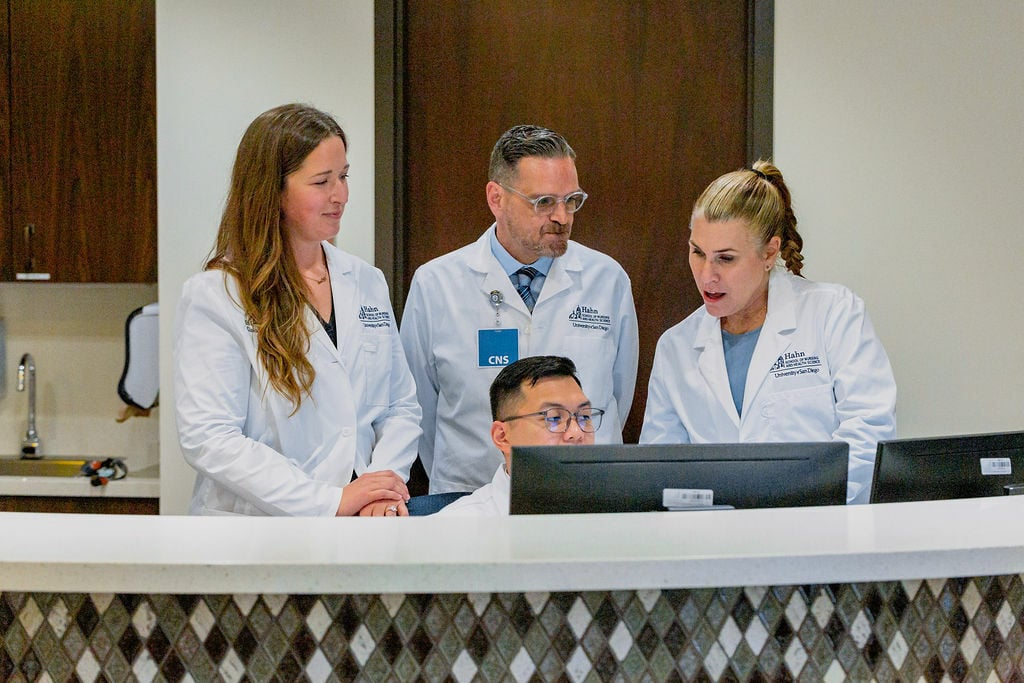
Discover the Benefits of a Nursing Degree From USD
The information in this blog post is for informational purposes only and is not intended to replace medical, financial, or professional advice.
2020 took everyone by surprise—especially healthcare workers. Nurses and doctors became our front line of defense as we faced an unprecedented public health crisis. In the years since we have seen much of the medical field pivot and change to create new guidelines and accommodate alternate methods of care delivery. Now, as we see the ebbs and flows of new strains, the United States has become accustomed to the idea that, unfortunately, COVID-19 is here to stay.
But that’s not the only challenge we’re facing as 2022 comes to a close. All across the country, Americans face a lack of affordable housing, skyrocketing interest rates, and escalating costs of living. Businesses large and small are feeling the economic downturn, too.
People say that healthcare is recession-proof, and while that may be true, the healthcare industry is facing its own reckoning — one that can’t be treated with business efficiencies, strategic plans, or cost-cutting. Fixing our broken healthcare industry will need the input of the largest segment of the healthcare workforce: nurses.
Nursing schools, associations, workplaces, and more must empower potential leaders in nursing to stand up, take a seat at the table, and demand that our institutions prioritize patients before profits.
Learn more about how nurse leaders are changing health care>>
An overview of some of the biggest challenges for nurses today
Nurses face myriad obstacles in the workplace, which make it difficult to provide the kind of care that inspired them to become a nurse in the first place.
Effects of the pandemic
The past few years have unexpectedly strained the healthcare system as healthcare workers fought — and continue to fight — to save patients from the devastating effects of COVID-19. Nurses put themselves in harm’s way to care for others, often without the PPE they needed in the beginning. There was a shortage of everything: beds, ventilators, and caregivers. Clinicians dealt with a staggering amount of death. Nurses and physicians opted to stay in hotels, rather than put their families at risk, and worked longer hours than they should have because their patients needed it.
Once efforts had shifted from the chaos of the initial pandemic response, nurses were asked again to lead the charge for speedy, effective delivery of vaccines and booster doses. We can thank them and various other healthcare workers that 68 percent of the population is fully vaccinated.
We are now grasping the consequences of COVID-19 on our healthcare workforce. In October 2021, a poll revealed that 1 in 5 healthcare workers had quit their jobs since COVID-19 hit the United States. More than one-third of the nurses in a recent survey say they’ll leave their job by the end of 2022, citing burnout and high-stress work environments.

(Alt-text: A Morning Consult poll shows 5 various bar graphs. The first two bar graphs show that, among healthcare workers who were asked whether they’ve left their jobs since mid-February 2020, 18% had quit and 12% had been laid off or lost their job. The last three bar graphs show that, among healthcare workers who have stayed in their jobs since mid-February 2020, 69% haven’t considered leaving their job, 19% have considered leaving their job and the healthcare industry altogether, and 12% have considered leaving their job for another role in health care.)
This means the already strapped-for-staff hospitals and health systems will have fewer nurses for the same amount of patients. And nurses will, once again, be asked to provide quality care in an impossible situation.
Technological advances in healthcare
Today’s healthcare providers rely on big data, predictive analytics, and highly customized information systems to optimize healthcare delivery and patient outcomes. These advances in technology require nurses to learn and adapt to new systems and procedures.
And, while data like this can increase efficiencies, some of this big data has flaws from human bias. Data bias can be pervasive, and it reinforces the need for more nurses to get involved in fields like nursing informatics.
Increase in chronic conditions
With rates of chronic disease on the rise, nurses are caring for larger numbers of long-term patients who are suffering from debilitating symptoms. These conditions, like diabetes, heart disease, and obesity, require ongoing care and treatment, which necessitate more time, care, and attention.
Aging population
In 2019, about 16.5 percent of the American population was 65 years old or over, and this figure is expected to rise to 22 percent by 2050. An aging population places additional strain on an already overworked healthcare system.
Workforce shortages
The demands being placed on the health care system are only being magnified by a shortage of trained nurses at all experience levels. As the general population ages, many nurses are also reaching retirement age and are transitioning out of the workforce—leaving gaps that need to be filled.
Leaders in nursing are committed to patients before profits
With numerous many demands placed on nurses, we need strong leaders who can adapt, manage, and collaborate to ensure that high-quality, patient-centered care is being consistently provided.
Nurses in leadership positions work to develop and improve processes that can help nurses overcome demanding obstacles and deliver better care to patients. Additionally, a nurse leader has the unique opportunity to serve as a mentor to less experienced nurses, giving them the tools and confidence they need to succeed in the field.
By bringing patient experience into nursing administration and mentorship roles, nurse leaders have a unique perspective on the demands being placed on today’s healthcare workers. Strong leadership in nursing can lead to system-wide advances caused by greater innovation, collaboration, and efficiency.
How to become a nurse leader
Leadership in nursing is a good fit for talented, service-focused, and self-motivated individuals who are dedicated to improving the systems and processes that affect all aspects of patient care. Finding your nurse leadership style is key — as is creating an evidence-based practice foundation.
A Master of Science in Nursing with an emphasis on leading and managing in nursing can help aspiring nurse leaders gain the knowledge, training, and experience necessary to implement change and motivate others.
After obtaining an MSN, nurses seeking leadership roles often obtain certification from the American Nurses Credentialing Center (ANCC) in nursing executive practice and advanced nursing executive practice; and from the American Organization for Nursing Leadership (AONL) in executive nursing practice or nurse manager and leader.
By pursuing an advanced degree and obtaining these certifications, you are preparing yourself to take on the responsibility of leadership in the nursing profession.
Earn your Executive Nurse Leader hybrid MSN at USD
If you’re thinking of becoming a nurse leader, look no further than USD’s Executive Nurse Leader MSN program. This hybrid program is designed to prepare graduates for leadership in executive and administrative roles across healthcare settings — and even in nursing jobs away from the bedside. Our faculty of nurse scientists and advanced clinicians teach you how to design and implement policy and how to apply information technology to nursing education.
Want to learn more about the University of San Diego's Executive Nurse Leader Hybrid (MSN) program? To request more information, give us a call at (619) 260-4548, or take a look at one of our nurse leader resources below.
The information provided by USD’s Hahn School of Nursing and Health Science is for informational purposes only and is not intended to replace professional medical or financial advice. This includes, but is not limited to, blog posts, eBooks, webinars, emails, graphics, social media posts, and other content. Always seek the guidance of your physician or a qualified medical or financial professional.
A Guide to Becoming an Executive Nurse Leader
The University of San Diego's nursing program ranks among the best in the nation. But that's not the only reason future students walk through our doors to pursue one of our graduate degrees. View our guide for an in-depth look at the Executive Nurse Leader - Hybrid (MSN) program and how our rich heritage of excellence in nursing education can help you achieve your academic and professional goals.
GET THE GUIDE








